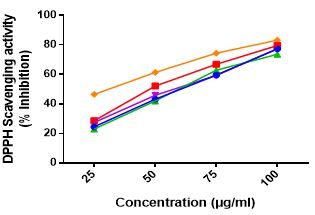Effect of processing methods on the antioxidant, physicochemical, and microbiological properties of non-alcoholic beverages made from Roselle calyces
DOI:
https://doi.org/10.54117/ijnfs.v4i1.79Keywords:
Squash, drinks, organoleptic attributes, fruits, roselleAbstract
Fruits and vegetables belong to an essential class of foods that supply the human diet with vitamins and minerals that are essential for normal body health and function. Hence, this study aims to provide an overview of the effect of processing on the antioxidant, physicochemical, and microbiological properties of non-alcoholic beverages made from roselle calyces using standard procedures. Roselle drink and squash were produced from roselle extract and pineapple juice at a ratio of 4:1 respectively using hot and cold-water extraction methods after pasteurization at 80oC for 5 min and aseptically packaged. The result showed that the pH of the samples CSS, HSS, CSS, and HPSS ranged between (3.89 to 4.44), total soluble solid (5.5-6.7 oBrix), viscosity (5.5-28.5 m. Pa.s), titratable acidity (0.62 to 1.40%), specific gravity(0.7856-1.019), vitamin C(43-47mg/100g). color dimension showed that L*( 14.3-21.9), a*(14.3-19.25) and b* (3.89-8.0). The antioxidant activity showed that phenol ranged between (58.51-79.59mg/100g), flavonoid (22.62-50.14mg/100g), and total antioxidant capacity (70.67-75.03mg/100g). DPPH, reducing power, total phenols, total flavonoids, and total antioxidant content increased significantly (p<0.05). The blending of pineapple fruit juice with roselle extract has improved antioxidant properties and good source of vitamin C. Therefore, the consumption of roselle-fruit juices with higher flavonoid and antioxidant activity will protect the human body from several diseases attributed to the reactions of free radicals.

Downloads
Published
How to Cite
Issue
Section
License
Copyright (c) 2025 Olawale P. Olatidoye, Gbemisola Olufunke Onipede, S. S. Sobowale, A. O. Alabi, O. A. Adeoti

This work is licensed under a Creative Commons Attribution 4.0 International License.
